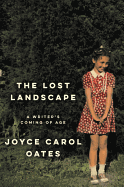
Prolific author Joyce Carol Oates (Lovely, Dark, Deep: Stories; A Widow's Story) chronicles her formative years in The Lost Landscape, a book that Oates states is "not meant to be a complete memoir of my life--not even my life as a writer," but rather "something more precious... an accounting of the ways in which my life (as a writer, but not solely as a writer) was shaped in early childhood, adolescence, and a little beyond." Oates, insightful and reflective, examines influential people, places and events that took root in her psyche beginning with her childhood in western New York State, a rural landscape north of Buffalo.
In the book's 28 essays, Oates reimagines the past and offers well-wrought remembrances of pivotal, defining moments, including a cleverly rendered piece narrated by the author's beloved pet hen from childhood. Each essay reveals more about Oates's character and her vulnerabilities, including bouts of childhood shyness, anxiety and insomnia, as she winds her way through college and graduate school, where she, disillusioned, felt like an outsider. The book poignantly closes with tributes to both of her parents and how, even in absentia, they continue to resonate in the author's life--creatively and otherwise.
Oates believes that a "writer is the decipherer of clues," and in this sensitive, illuminating exploration of her early years, she offers fascinating glimpses of the ways in which reality has often served to inspire the fictitious worlds and characters she has created in her wealth of novels and stories. --Kathleen Gerard, blogger at Reading Between the Lines

